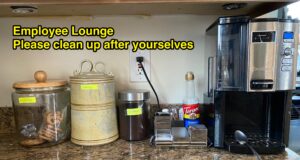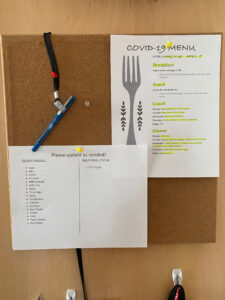How to Create the Ideal Work From Home Environment
Whether by necessity or by choice, remote work as well as working from home has become a popular choice for workers who seek a bit more flexibility and a bit less money spent on transportation. Working from home (or while mobile) comes with its own struggles, though. Many find it difficult to stay focused and motivated to get their tasks done while their families are running around them or their comfy couch entices them to nap instead of work. Here are a few tips for creating the ideal workspace to help you get things done while enjoying the benefits of working from home!
Dialogue With The People You Live With
 Yes – I know you talk all the time with them. But this is the time to actually discuss what working at home means. This is a great place to discuss boundaries, chores, learning wor work styles, and setting up space that “needs to not be touched” versus flexible family space. Draw up some agreements and get buy-in from everyone. This includes breaks, meals, errands, and even laundry expectations.
Yes – I know you talk all the time with them. But this is the time to actually discuss what working at home means. This is a great place to discuss boundaries, chores, learning wor work styles, and setting up space that “needs to not be touched” versus flexible family space. Draw up some agreements and get buy-in from everyone. This includes breaks, meals, errands, and even laundry expectations.
 Remember those folks who are used to being home will forget that you may still be in work mode while they are hungry or looking for a snack and forget to clean up. I prepared snacks that were super easy for folks here to grab. I even created a space in the kitchen as a reminder that we are all in this together.
Remember those folks who are used to being home will forget that you may still be in work mode while they are hungry or looking for a snack and forget to clean up. I prepared snacks that were super easy for folks here to grab. I even created a space in the kitchen as a reminder that we are all in this together.
Create a Designated Office Space
The first and most important thing to do is to set aside a designated space as your “office.” It can be a corner of a room or an entire room, but make it separate from the rest of your home. This is as much a mental strategy as it is a physical need: you can train your brain to focus better within certain surroundings. Plus, setting this space apart allows you a sort of barrier between work and home life so that one doesn’t become overrun by the other and thus cause a stressful association for both! If you can, spend some extra money on yourself and invest in a good chair. It makes all the difference.
Set Expectations
Establish your goals, generally and specifically for your workday. What tasks should be completed daily, and what tasks are subject to your work needs? How much time do you intend to allot to each of these tasks? How will you check your work to ensure a high standard of quality despite your less-professional surroundings? How will you plan and carry outbreaks throughout your day? As you set these expectations for yourself, write them down. Start your day with a checklist, or layout a detailed schedule. Commit to sticking to these tasks and this schedule strictly! Then, as you follow and complete these expectations, you can adjust or adapt your schedule as needed. You will also find that time management and routine come more naturally to you!
Figure Out Best Conditions
Part of finding a good space is checking off a list of requirements you have for effective work. For example, remote work will always (or almost always) require a strong internet connection. This means finding a spot in your home that is close to your network router with few to no blockages. You should also find somewhere quiet, where noises won’t pose as a distraction. The amount of space is an element you can work with—you do not need tons of space to fit you and your desk and computer, but a healthy amount of space to stretch out every once in a while is a helpful feature if available.
Get Fresh Air
 Fresh air can help wake up your brain and body, and get you feeling more energized and rejuvenated to continue work. Nature also has a soothing and relaxing effect on your mind that can relieve the stress built up from work tasks. You might consider creating a small space in your backyard to escape for brief breaks or even to work for small chunks of your day! If you don’t already have a plausible space for working in your backyard, a deck might be your answer! A deck is the perfect place to relax and enjoy the fresh air as you work. On this topic, take breaks! I am the worse offender of this myself. Schedule them into your outlook or day planner if you have to.
Fresh air can help wake up your brain and body, and get you feeling more energized and rejuvenated to continue work. Nature also has a soothing and relaxing effect on your mind that can relieve the stress built up from work tasks. You might consider creating a small space in your backyard to escape for brief breaks or even to work for small chunks of your day! If you don’t already have a plausible space for working in your backyard, a deck might be your answer! A deck is the perfect place to relax and enjoy the fresh air as you work. On this topic, take breaks! I am the worse offender of this myself. Schedule them into your outlook or day planner if you have to.
Create Motivation
 Keep up your motivation to work hard and work well! Incentivize completing your tasks by rewarding completion with a short break doing something you love, like going for a quick walk or making a snack. Make plans for when the workday is done to relax and unwind. Visualize the end product of your tasks, take a moment to talk to someone about what you do and why you do it. Write down something you’re saving up for or a trip you’re looking forward to, and put it somewhere easily visible! Anything that helps you feel more excited to get the job done will function as effective motivation. But even more so, finding a reason to enjoy your work as you do it will make the day fly by!
Keep up your motivation to work hard and work well! Incentivize completing your tasks by rewarding completion with a short break doing something you love, like going for a quick walk or making a snack. Make plans for when the workday is done to relax and unwind. Visualize the end product of your tasks, take a moment to talk to someone about what you do and why you do it. Write down something you’re saving up for or a trip you’re looking forward to, and put it somewhere easily visible! Anything that helps you feel more excited to get the job done will function as effective motivation. But even more so, finding a reason to enjoy your work as you do it will make the day fly by!
Design it Well
Design your space to help your mind stay clear, focused, and alert. Neutral colors like off-whites, grays, or soft blues are great for fostering creativity without being overwhelming. Lighter colors encourage more light, in general, to reflect within the space of your office! Add some décor like plants, mirrors, and paintings to further welcome in some color and visual interest to help your mind explore various ideas. Make your office feel professional through your furniture! Wooden desks come in a variety of colors and are as beautiful as they are functional. Filing cabinets and bookshelves offer clean and organized storage options that will make your office truly feel like an office.
Make Sure You Have What You Need
Make sure you are well prepared for whatever you need to do during the day! Frequent trips out of your designated office space create plenty of opportunities for distraction that you don’t want. Stock your space with whatever materials you need, and keep those materials organized. Remember the basics like paper, writing tools, cords, even personal items like tissues and water! As for the bigger items of your office: invest in a good chair! An uncomfortable chair is impossible to ignore and can actually cause major damage to your spine and neck. Prepare yourself for an effective workday by providing yourself with all the necessary tools to perform well!
Good Lighting
Poor lighting causes your eyes to strain, which thereby causes your body to become tired. If at all possible, pick a space that has access to windows to let in as much natural light as available! Find lamps that offer sufficient lighting for darker days or working into the evening. The amount of light around you has a huge impact on your productivity levels and positivity levels! The brighter your surroundings, the more likely you are to feel good during whatever task you are doing.
Your home office can be as good—if not significantly better—than an office building. Using the right design styles and professional strategies, you can create a home workspace that you love!
Read this next: How to Become a More Capable Entrepreneur



